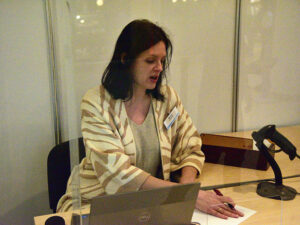Voting for Tradition, Hoping for Change
By Lilly Riddle
TALLINN, Estonia — This year marked Mariko Jõeorg’s first as a poll worker, taking down Estonian voters’ names as they filed beneath a white overhang that read “Tule Valima!” (Translation: “Come and choose!”) The banner was visible from every floor of the modernist-style Solaris Center’s elliptical balconies, which bustled with shoppers and gleamed with fairy lights.

Jõeorg said Sunday was her busiest yet for Estonian citizens participating in 2023’s parliamentary elections, which take place every four years.
“Young people, old people, but also very young people… they all come here,” Jõeorg said.
At stake this year were the 101 seats of the Riigikogu, or Parliament, with the winning party forming the government and confirming the prime minister. On Sunday night, the Reform Party—led by Kaja Kallas, who became Estonia’s first female PM in 2021—won the most seats with 31% of the vote.
Electronic voting began the Monday of election week and ran through Saturday, but in-person voting continued through Sunday. This year, Estonia saw the most online votes of any election at more than 313,000, setting a new record.

Kerttu Rakke, clad in a gray beanie and Windsor glasses, waited until the last day because it’s a “tradition.” She hopes her chosen candidates—she wouldn’t say who—bring “less harm” to constituents than their predecessors.
“If you want to be a great country, you should care first for your own people,” she said. “I speak the Estonian language, a little English, and a little Russian. I am very Estonian and very much for Estonian culture.”
Melissa Stint, 23, has voted in parliamentary elections “every single time” since she was first able to at age 18. She said she was rooting for the Social Democratic Party (Sotsiaaldemokraatlik Erakond, or SDE), which ended up garnering 9.4% of the vote.
“[SDE] align with my views on everything—climate change, human rights,” she said. “I think more young people are motivated to vote because you’re voting against something instead of for something.”
Stint was specifically voting against the Conservative People’s Party of Estonia, or EKRE, which has the second-highest number of seats in Parliament. EKRE—a right-wing party that supports shifting public education toward Estonian-language instruction and reducing funding for abortions—won 17 seats to Reform’s 37.
Keeping EKRE out of office—or at least minimizing their seat count—was also a reason behind Gerth and Maarja Treufeldt’s decision to cast a ballot.
“The biggest issue is EKRE, in a nutshell,” Gerth said.
A coalition government including EKRE, which entered office in 2019, aimed to put forth a referendum with a question on whether the definition of marriage should remain a union between a man and a woman. The referendum failed to get enough votes from members of parliament in 2021, but the saga helped establish EKRE as ideologically and tactically similar to other radical, populist parties in Europe and the United States.
“The talks about taking control of abortions, taking control of same sex registration,” Maarja said. “It’s like, ‘Why back to Stone Age?’ We want to act more like the world.”

More than anything, the couple felt their voices would not be heard until they participated in the democratic process.
“If we don’t do it, we don’t have a say in, ‘Oh this is wrong with the government,’” Maarja said. “When things are happening that you don’t like, you have no right to moan about it.”